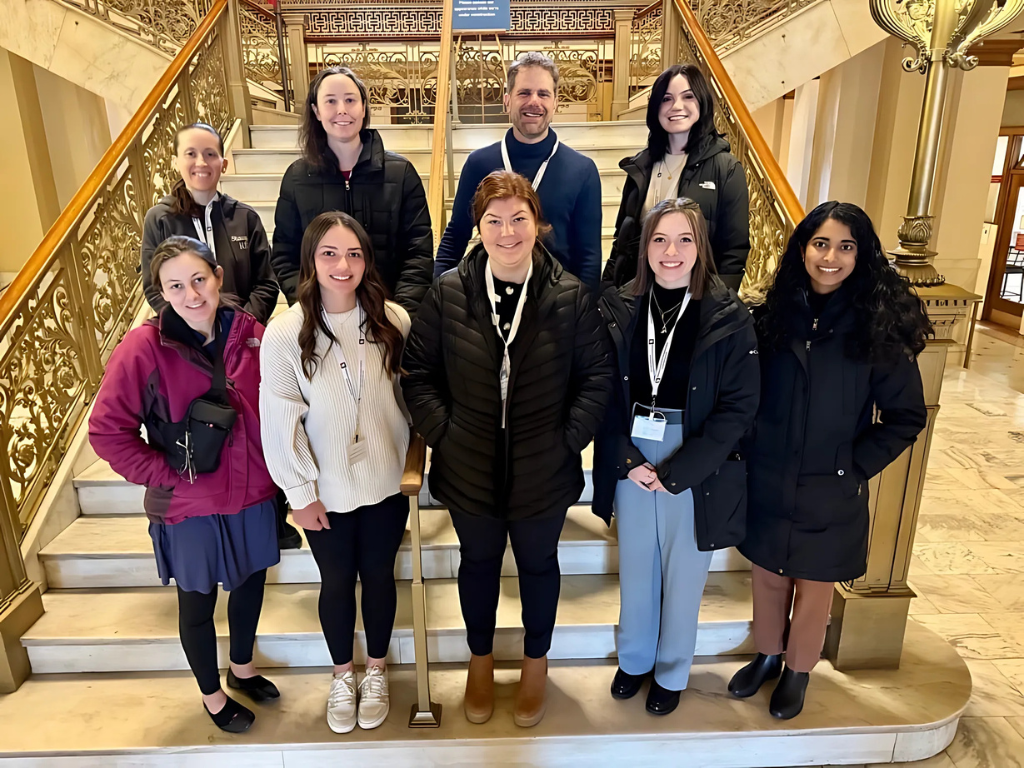
Better Together: Wisconsin AHEC Scholars Navigate Pathways to Recovery
In the heart of Wisconsin’s winter, something extraordinary happened. Nine aspiring healthcare professionals gathered for three transformative days, beginning an exploration that would expand their understanding of one of healthcare’s most pressing challenges: supporting individuals on their path to recovery from substance use.
This wasn’t just another training session. This was our Wisconsin Area Health Education Centers (AHEC) Scholars Community Health Immersion (CHI) program, where future healthcare leaders dive deep into the real-world complexities of serving communities in need. The timing couldn’t have been more significant – January 2025, Substance Use Disorder Treatment Month, a time when our nation collectively focuses on breaking down barriers and building bridges to recovery.
Where Healthcare Education Meets Community Need
At Northeastern Wisconsin Area Health Education Center (NEWAHEC), we know that creating meaningful change in healthcare requires more than technical knowledge alone – it demands hearts that understand, minds that remain open, and hands ready to help. Our CHI experiences bring this philosophy to life, offering healthcare students a unique opportunity to step beyond traditional classroom walls and into the communities they’ll one day serve. What truly sets this program apart is its immersive approach to understanding healthcare challenges in rural and underserved communities.
A Deep Dive into Recovery Support
This January’s immersion focused on “Navigating Pathways to Recovery: Addressing Substance Use with Healing and Resilience.” Our scholars didn’t just learn about recovery – they witnessed it. They met the people who make recovery possible: from police officers turned Drug Recognition Experts to peer support specialists, from mental health counselors to trauma-informed yoga instructors. But perhaps most importantly, they connected with individuals actively working their own recovery journeys – people who demonstrate daily that healing is possible and who often become the strongest advocates for others seeking help. These lived experience perspectives provided scholars with invaluable insights into both the challenges and triumphs of the recovery process.
The statistics tell us why this matters: Wisconsin faces unique challenges with substance use, from deeply rooted alcohol culture to the devastating impact of the opioid crisis. In 2023 alone, Wisconsin experienced over 1,500 opioid-related overdose deaths. But numbers only tell part of the story. What our scholars discovered was the power of community in recovery – the network of dedicated professionals and support systems that make healing possible.
As author Johann Hari powerfully states, “The opposite of addiction is not sobriety. The opposite of addiction is connection.” This truth resonated throughout our immersion experience, where our scholars witnessed firsthand how recovery flourishes through community support.
Looking Ahead: Your Guide to Recovery Resources
This immersion experience marked the beginning of an important journey – not just for our scholars, but for our entire healthcare community. We’re eager to introduce you to the remarkable individuals and organizations who bring their expertise, compassion, and dedication to supporting recovery in Wisconsin. We look forward to featuring a different aspect of the continuum of care, offering practical insights for healthcare providers, students, and anyone interested in supporting those on the path to recovery.
Whether you’re a healthcare professional looking to better serve your patients, a student considering attending a future Community Health Immersion, or someone interested in understanding community resources, we invite you to join us on this journey. Together, we can build a stronger, more compassionate healthcare system that truly serves our communities.
Stay tuned for our next post, where we’ll explore the evolving landscape of substance use from the perspective of Nick Place, a police officer and Drug Recognition Expert (DRE). His unique perspective bridges the gap between law enforcement and public health.
Interested in attending a Community Health Immersion? Priority is given to AHEC Scholars, but other students may join as space allows! These impactful experiences cover diverse healthcare topics and are offered across Wisconsin.
👉 Learn more about Community Health Immersions 👉 Discover the Wisconsin AHEC Scholars Program
